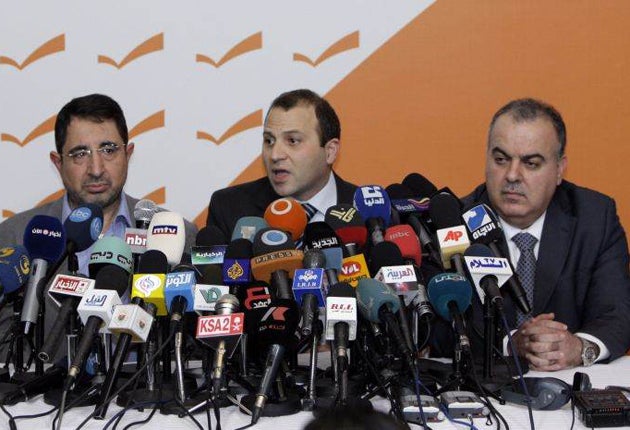Lebanon in crisis as Hezbollah forces collapse of government

Hezbollah and its allies brought down the Lebanese government yesterday amid growing tensions over a UN-backed tribunal investigating the 2005 assassination of Rafiq Hariri, a former prime minister.
The collapse of the 14-month-old national unity government led by Saad Hariri, the slain politician's son, has plunged the country into its worst political crisis since it stood on the brink of civil war two years ago.
Ten ministers allied to Shiite movement Hezbollah handed in their resignation as Mr Hariri was due to meet US President Barack Obama in Washington. Adnan Sayed Hussein, a minister allied with Lebanon's President, later joined them, bringing the resignations up to the number required to dissolve the 30-strong cabinet.
"This cabinet has become a burden on the Lebanese, unable to do its work," energy minister Jibran Bassil said at a news conference to announce the resignations. "We are giving a chance for another government to take over."
Mr Hariri immediately cut short his visit to Washington to head for Paris, where he was to meet with French President Nicholas Sarkozy for consultations on the government's collapse before returning to Beirut.
Lebanon's fragile government, an uneasy coalition of competing interests, has been paralysed by tensions stemming from a UN-backed investigation into the Hariri assassination that is expected to implicate members of Hezbollah. The cabinet has met just once in the last two months.
Hezbollah has denounce the investigation as an "Israeli project". Hassan Nasrallah, the movement's leader, has warned repeatedly that it would not stand by and let itself be accused.
The collapse of the government was seen as imminent after Hezbollah warned it would walk out if Prime Minister Hariri did not convene a special cabinet meeting to discuss breaking off all cooperation with the UN Special Tribunal for Lebanon.
Regional leaders have sought to resolve tensions stemming from the tribunal to try to stave off renewed sectarian conflict among the country's Sunni, Shiite and Christian population. But a Saudi-Syrian initiative this week ended in failure.
Washington has resisted efforts to reach a face-saving deal on the tribunal's findings. US Secretary of State Hillary Clinton yesterday condemned the move by Hezbollah, describing it as a "transparent effort to subvert justice", saying that the work of the tribunal "must go forward so justice can be served."
The UN tribunal has not said yet whom it will indict, but it told Mr Nasrallah in October that several members of Hezbollah potentially faced indictment. Hezbollah has leaned on Mr Hariri to reject the tribunal's findings, but so far he has refused to bow to pressure.
Since Rafiq Hariri's death in a bombing on the Beirut seafront five years ago, Hezbollah has tussled with its opponents over the country's direction. Rafiq Hariri, who resigned as premier in 2004, was widely revered for his efforts in rebuilding Lebanon after its 15-year civil war that ended in 1990. He also enjoyed popular support among the country's Christians.
More recently, Hezbollah has emerged as the most potent political force in Lebanon amid cracks among its opponents. Although Saad Hariri has the backing of Saudi Arabia and Washington, the Obama administration is seen as less solid in its support than the previous administration. Hezbollah, which has attracted growing support over its dogged resistance to Israel, is backed by Syria and Iran. Any link to the 2005 assassination could dent domestic support.
Analysts said that they did not expect Hezbollah to launch a repeat of May 2008, when it briefly seized control in Beirut amid fury over the government's efforts to weaken it.
Lebanon's unstable politics
February 2005 A car bomb kills former Lebanese Prime Minister Rafiq Hariri in Beirut. The UN begins an investigation.
April 2005 'Cedar Revolution' forces Syrian troops to withdraw from Lebanon.
June 2005 An anti-Syrian alliance led by Saad Hariri wins control of parliament.
July 2006 Lebanon's militant Hezbollah seizes two Israeli soldiers leading to Israeli attack.
May 2007 The UN Security Council authorises Hariri assassination tribunal.
February 2009 Three Hariri assassination suspects are released from prison in Lebanon.
July 2010 Hezbollah's leader Hassan Nasrallah says members of the group would be indicted by the tribunal.
August 2010 Nasrallah declares that the UN tribunal is in league with Israel.
Join our commenting forum
Join thought-provoking conversations, follow other Independent readers and see their replies
Comments
Bookmark popover
Removed from bookmarks